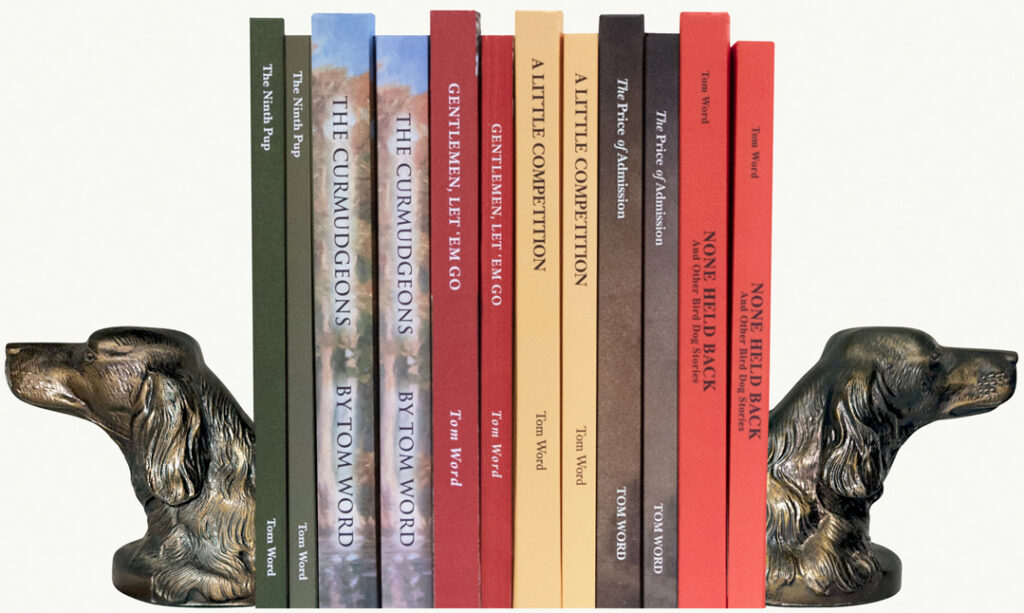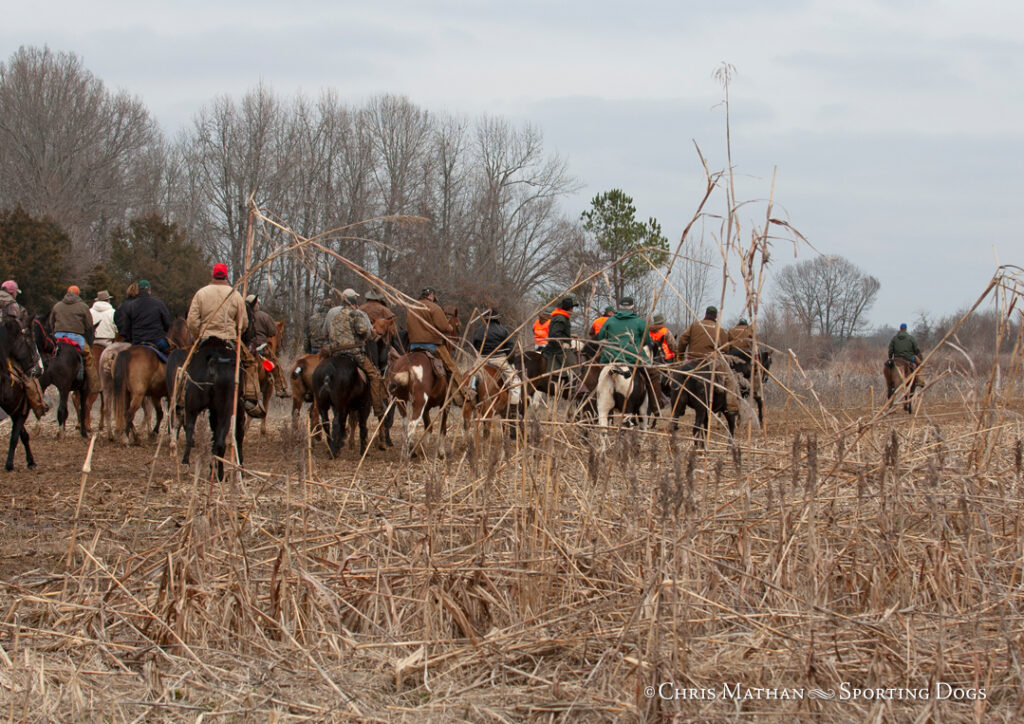Billy Berg was going to Grand Junction, the Ames Plantation, for the National Bird Dog Championship! He could not believe it. He had been running dogs on the all-age circuit only three years. Before that he had apprenticed under his father, John, who ran shooting dogs for the public on the horseback shooting dog circuit out of New Jersey.
Billy had endured lean times but had some success. His owners were mostly one-dog sponsors who had been patrons of his father and placed a dog with him out of affection for his father. But now he had “made his bones,” qualified a dog for the National. This required that the dog win two firsts in open all-age stakes of an hour. Not easy to do, for hour stakes attracted large entries from all-age handlers pursuing the same goals as him, most with deeper strings.
The pointer Billy had qualified had been whelped by his father’s best-ever shooting dog female, sired by an all-age multi-champion winner out of Kentucky. Its name was Quick.
Now Billy must prepare Quick for the National, for a three-hour heat in weather that might be very cold or unseasonably warm, even hot. He used his iPad to check the weather stats for February in west Tennessee. Daily lows averaged 39, daily highs 56, but the averages were not the worry, the possible swings were. And the possibilities for rainfall and worst of all, ice. The area was particularly susceptible to monstrous ice storms in mid-February, caused by moist air coming up from the Gulf of Mexico meeting frigid air coming down across flat prairies all the way from the arctic, colliding in West Tennessee. The record year had been 1994 when much of a wide area lost electric power for nearly a month, due to power lines downed by falling ice-laden tree limbs.
Billy turned first to his father for advice. His father had done it all. Born the son of a Lee County, Georgia share cropper, he had following high school worked on a rich-Yankee-owned shooting estate near Thomasville, progressing from kennel cleaner to horse holder, to second team dog handler, to first team trainer-handler on a neighboring estate that hired him away from his first employer. He had understood from the start that safety and how you managed the guests were the most important aspects of the job. His natural touch with animals, canine and equine, had complimented his kind, patient way with people.
A mid-life crisis had moved John from his secure plantation job to handling trial shooting dogs for the public, primarily for a patron who lived spring and summer in New Jersey where his business was located, and fall and winters in Southwest Georgia. John was sixty now, and had secret thoughts of returning to the Georgia shooting plantation world.
Father and son met for Christmas at the father’s home in New Jersey, near historic Briardale Farm at Estell Manor. Briardale had been owned by Anthony (Tony) Imbesi, a founder of 7-Up Bottling who had died at 71 in 1981. It had been the home of Tony’s beloved Briardale Setters in addition to his thoroughbred breeding and training facilities. At Tony’s death it contained 6,000 contiguous acres, the largest horse farm east of Texas. Today the farm held 2400 acres and was owned by a partnership of Tony’s heirs. John’s principal owner, Fred Eanes, who also owned Quick, had secured a dog training lease on part of it for John.
“The National is unlike any other trial, son. Three hours is eternity for a bird dog hunting in front of a horse. And hunt is what he must do. He has got to handle and hunt with no let up the whole three hours.
“Here is what you should do. Take Quick to a plantation with wild birds and put him on the shooting wagon. Hunt him hard for three weeks. Then find a place near Grand Junction that hunts fall release birds horseback and hunt him there. He has got to learn the scenting conditions in that country, what it smells like,” John told Billy.
That’s what the father-son team did. Fred Eanes called in a chip and got Quick a spot on the hunt truck at Chinquapin Farm at Lake City, Florida, former home of the Florida Championship. There wild quail were hunted horseback to field trial standards. The chip existed because Fred Eanes was a road builder and had been a long time patron of Florida Rock Industries, and Chinquapin was owned by Florida Rock’s founding family, the Bakers.
Then through another old contact from John’s shooting plantation days, they located near Holly Springs, Mississippi a family-owned shooting estate that hunted fall-release birds from horseback, and Quick got a place for ten days on its shooting wagon. Billy and John came with Quick, and relieved the hunt manager so he could take his wife on a wedding anniversary vacation, a good deal all around. They left for Grand Junction with a new set of friends at Holly Springs and Quick tuned up for the conditions he would face at the Ames Plantation and in a hunting and handling mood.
Quick drew the last brace at the Bryan Hall drawing the Saturday night before Monday’s start of the National. His brace-mate would be the dog leading in the Purina Points race for Dog of the Year. He had run in two earlier National Championships and finished the three hours with a credible bird score each time. He was the gallery favorite for winner this year. His name was Magnificent Sam and his owner was Sam Scales, owner of a firm that made medical equipment and a long time patron of the bird dog game. He and Quick’s owner Fred Eanes had been friendly rivals many years.
All knew luck played a strong role in winning the National. To win, a dog had to draw a time when birds were on the course and moving. Out of an average of nine days of running (for a 36 dog entry) birds would likely be moving no more than a fourth of the time, often less. Unless a dog drew one of those times, it had no chance no matter its talent.
When Quick’s time finally came, only three dogs had made credible bids for Champion, with a good ground race for the three hours, a credible finish and a bird score near the top. Every dog was tired at the end of three hours, but to win it needed enough energy left for a deep final cast at good if not great speed. In a close contest strength of finish was often a deciding factor, especially in the National Championship where stamina was critical.
The National had a reputation (deserved or not) for being decided most years by counting finds. But looking at the stake’s long history, it had been won with as few as three (one an hour). When the last brace was released the three dogs in contention had scored 5, 6 and 7. Gallery sentiment was about evenly split among them.
Fred Eanes would ride front for Quick and Sam Scales would ride front for Magnificent Sam.
Weather turned out ideal for the Quick-Sam morning brace, fifty degrees and overcast. Whether birds would be moving was everyone’s guess.
At the half way mark, Quick and Sam each had four finds, all at the front and well handled. The gallery was silent save for the sounds of hooves and bit chains tinkling, sure sign of good performances being watched intently. The next hour produced three finds for each dog and each was hunting to the Amesian standard, a standard written long ago by Hobart Ames just for the stake. Ames had sponsored the trial from near its start in 1896, judged it many years, and his wife had left the plantation in trust for the University of Tennessee with permission for the National Bird Dog Championship to continue annually on it.
When time expired Quick and Sam were even in finds with eight each, handled faultlessly. They were both out of sight to the front. The three judges called a halt and the senior judge announced: “Gentlemen, you each have thirty minutes to show us your dog.”
Billy and John lit out for the spot where Quick had taken an edge where the edge peeled right out of sight. Sam’s handler and scout rode fast into woods dead ahead where Magnificent Sam had last been seen three minutes before time expired. The judges and gallery sat their mounts in silence, straining their ears in hopes of hearing “Point” yelled by a handler of scout.
Twenty-five minutes of silence expired and hope was fading. All were thinking, how sad it would be if these two magnificent performances went unrewarded, which was about to happen. Then came a distant call, “Point!”
Veterans in the gallery knew it was the distinctive voice of John. The judges, breaking their rule against cantering, broke into a gallop for the sound, now being repeated in a steady cadence every twenty seconds. Then came the sight of John’s orange cap raised from a hummock in a clearing a hundred yards ahead of the riders.
When the judges arrived John and Billy were mounted six feet apart. Thirty yards ahead stood a pointer, straight up tail the only part visible but that enough to identify the dog by a tiny tilt forward at the tip. It was Magnificent Sam, and his birds were quickly flushed by Billy at the senior judge’s instruction (Quick’s time had run out). Sam stayed put.
With tears in his eyes Billy took the tracker from a judge. It showed Quick standing birds a hundred yards away.
Back at the Manor House an hour later the judges emerged on the porch in jackets and ties and after thanks were said to judges and sponsors, the secretary announced, “This year’s National Champion is Magnificent Sam.”
After congratulations were spoken and many hands shaken, Sam Scales walked to Billy and John and said,
“Gentlemen, could you give me a few minutes to talk with you, and thank you for what you did. I realize you could have just kept looking for Quick, and you would likely have found him in time.”
After the crowd dispersed Sam invited Billy and John to join him sitting on the porch steps.
“Boys, I want to offer you jobs. I have sold my company and bought Mossy Swamp Plantation at Thomasville. John, I would like you to manage it, and Billy, I want you to be my dog trainer and manage the hunting. You two can keep for me a couple of trial dogs we will run in the piney woods stakes and here if we qualify one. I want you to take young dogs to South Dakota in summer. And you can keep running Quick for Fred and he’s welcome at Mossy Swamp any time.”
Their smiles told Sam Scales their answers before he finished the offers.

10% OFF through Saturday, November 25….All Tom Word Books, hardcover and paperback!!!
